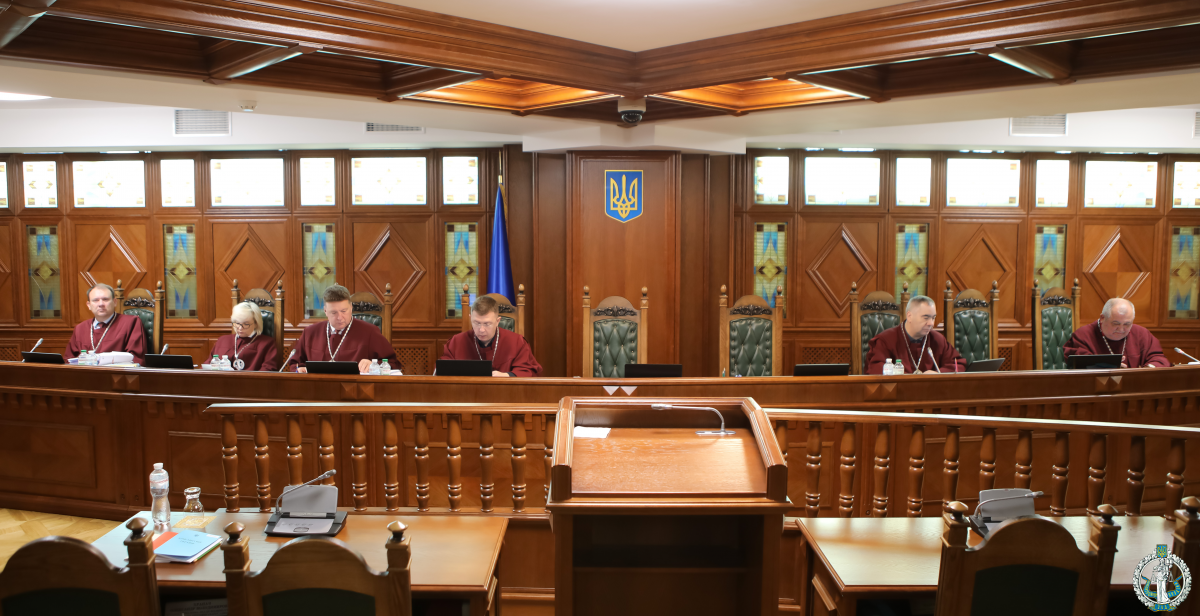 On 23 October 2024, the Second Senate of the Constitutional Court of Ukraine commenced deliberation of the case upon constitutional complaint of Volodymyr Treizub at the public part of the plenary session in the form of written proceedings.
On 23 October 2024, the Second Senate of the Constitutional Court of Ukraine commenced deliberation of the case upon constitutional complaint of Volodymyr Treizub at the public part of the plenary session in the form of written proceedings.
During the plenary session, the judge-rapporteur in the case, Oleg Pervomayskyi, outlined the main content of the constitutional complaint and the complainant's arguments. In particular, the judge noted that Volodymyr Treizub had filed a complaint with the Constitutional Court of Ukraine to verify the compliance of Article 81.3.2 of the Criminal Code of Ukraine (hereinafter, the “Code”) with Articles 3.1, 23, 28.2, 63.3 of the Constitution of Ukraine.
According to Article 81.3.2 of the Code, conditional release from serving a sentence may be applied after the convict has actually served “at least two-thirds of the sentence imposed by the court for a corruption minor crime or a criminal offense related to corruption, violation of road traffic regulations, or use of vehicles by the persons, who drove vehicles under the influence of alcohol, drugs or other intoxication or were under the influence of drugs that reduce attention and reaction speed, intentional grave crime or reckless especially grave crime as well as if a person has previously served a sentence of imprisonment for an intentional criminal offence and, before the conviction is cancelled or removed, has again committed an intentional criminal offence for which he or she was sentenced to imprisonment.”
According to the complainant, “the extension by the courts of Article 81 of the Criminal Code of Ukraine to persons convicted of a grave corruption crime to imprisonment, without determining for them a special and appropriate procedure for their early release from serving this sentence, causes legal uncertainty in law enforcement”, and its inapplicability to persons who committed a grave corruption crime and are serving a sentence of imprisonment, the institution of conditional early release from serving such a sentence “testifies to the absence of any prospect of release of such persons” and “has a purely punitive function as a consequence”, which contradicts Articles 3.1, 23, 28.2, 63.3 of the Constitution of Ukraine.
According to the judge-rapporteur, the content of the constitutional complaint and the materials attached to it shows the following.
The court of first instance granted the application of the State Institution “Mena Correctional Colony” and the Supervisory Commission of the Mena City Council for the conditional early release of convicted prisoner Volodymyr Treizub. The court of first instance, in justifying its decision, noted that convicted Volodymyr Treizub should be released on parole from serving his sentence of imprisonment, as he had proved his reform by his behaviour and attitude to work, had actually served more than two-thirds of his sentence, and the restrictions set out in Article 81 of the Code did not apply to him.
In turn, the prosecutor appealed the decision in the court of appeal, which upheld the prosecutor's appeal, cancelled the decision of the court of first instance and delivered a new decision, which dismissed the application for conditional release of convicted Volodymyr Treizub from serving his sentence due to the fact that that it was impossible to apply the rules of Article 81 of the Code, which does not establish grounds for early release from serving a sentence for a person convicted of a grave corruption offence.
The judge-rapporteur also informed that in order to ensure a full and objective deliberation of the case and to ensure that the Court deliveres a reasoned decision, he had prepared inquiries to a number of bodies of state power, scientific institutions and higher education establishments with a request to express their positions on the issues raised in the constitutional complaint.
After examining the case materials in the public part of the plenary session, the Second Senate proceeded to the in-camera part of the plenary session for a decision.
The plenary session is available on the official website of the Court in the section “Archive of video broadcasts of sessions”.

